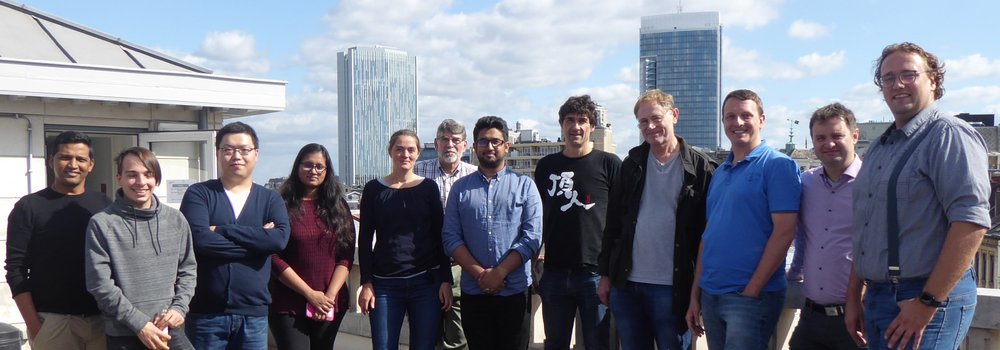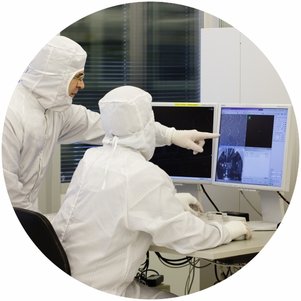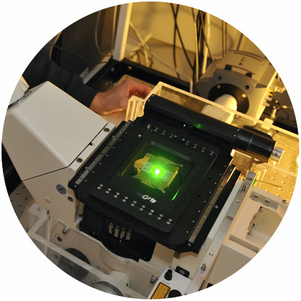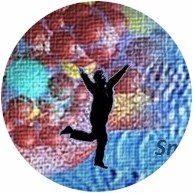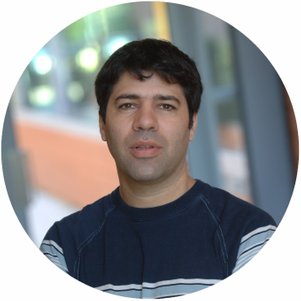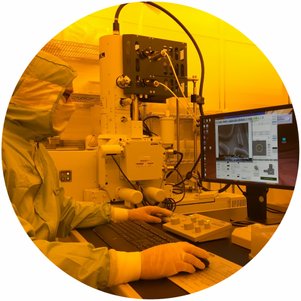PARTNERS
AN INTERNATIONAL TEAM OF RESEARCHERS AND TECHNOLOGISTS WILL WORK TOGETHER FOR FIVE YEARS TO RUN THIS HIGHLY INTERDISCIPLINARY RESEARCH PROJECT TOUCHING MATHEMATICS, BIOLOGY, ENGINEERING AND COMPUTATION.
LUND UNIVERSITY
NanoLund and Solid State Physics
NanoLund webpage
NanoLund (founded in 1989 and headed since 2013 by Prof. Heiner Linke) is the Center for Nanoscience at Lund University. It engages about 270 scientists at three faculties, working primarily in materials technology, physics and for applications of nanostructures in electronics, photonics and in life sciences. Our main research contribution to Bio4Comp is to translate algorithms into physical networks. Further, we will contribute to the development of architectural elements for computational networks, including programmable gates, FET based electric detectors for filaments, and error-proof junctions, and we will develop nano-imprint lithography methods to enable fast network replication. We are also responsible for leading activities to help build a research and innovation ecosystem around network-based biocomputation.
TECHNISCHE UNIVERSITÄT DRESDEN
B CUBE – Center for Molecular Bioengineering
B-Cube Diez-Group homepage
B CUBE was founded in 2008 as a Center for Innovation financed by the German Federal Ministry of Education and Research. The center operates as a scientifically independent unit of TU Dresden. B CUBE research focuses on the investigation of living structures on a molecular level, translating the ensuing knowledge into innovative methods, materials and (nano-)technologies. The research tasks within Bio4Comp will include network design optimization and error calculation, as well as contributing expertise in kinesin-microtubule motility systems. Further, the group will optimize the geometrical layout of the network junctions, implement and test switchable junctions based on thermo-responsive polymers, work on the multiplication of cytoskeletal-based agents (patent pending), and test electrical filament detection systems.
LINNAEUS UNIVERSITY
THE MOLECULAR MOTORS AND BIONANO GROUP AT THE DEPARTMENT OF CHEMISTRY AND BIOMEDICAL SCIENCES
Linnaeus University webpage and contact
The Linnaeus University (LnU) is Sweden´s youngest University formed by a merger of two smaller Universities and founded on their strong tradition in teaching and scientific accomplishments. The Molecular Motors and Bionano Group have studied the muscle proteins actin and myosin for two decades. Fundamental biophysics, muscle diseases and the interaction of the proteins with artificial surfaces as well as their usefulness in nanotechnological applications have been investigated. Major roles in Bio4comp will include modelling of motor and filament systems, upscaling efforts with focus on biology, e.g. multiplication of actin filaments and finally, functional testing of biocomputation devices.
MOLECULAR SENSE LTD.
Molecular Sense webpage
Molecular Sense Ltd. which is a research-intensive SME, is offering products, technologies and services in three strategic areas: novel biocomputation and biosimulation techniques; prediction of biomolecular behaviour on surfaces, from visualisation of molecular surfaces to prediction of protein adsorption on biomaterials; and diagnostic and high throughput devices with excellent sensitivity. In the area of super-sensitive biodetection devices, MolS develops novel technical solutions and devices for the markets of biomedical microdevice and biomaterials through the integrated use of experimental techniques, in particular those originating in the semiconductor technology, coupled with modelling and simulation. In this project, we will primarily contribute to the exploration of new types of problems suitable for bio-agent network computing.
BAR ILAN UNIVERSITY
Bar Ilan University webpage and contact
Bar-Ilan University (BIU) is the second largest research university in Israel, and is the fastest growing higher education institute in Israel. Bar Ilan's Faculty of Engineering is a dynamic, multi-disciplinary institution, and a leader in High Tech R&D. The BIU group, headed by Dr. Hillel Kugler, will develop new simulation, analysis and verification methods and tools to support a robust design methodology for constructing biocomputational devices. It will also investigate the theoretical aspects of computing using biological agents and explore new encodings and applications of the underlying technologies developed in the project.
FRAUNHOFER-GESELLSCHAFT
FRAUNHOFER INSTITUTE FOR ELECTRONIC NANO SYSTEMS
FRAUNHOFER INSTITUTE FOR SILICATE RESEARCH
Webpage Fraunhofer ENAS, Webpage Fraunhofer ISC
The Fraunhofer-Gesellschaft (in full: Fraunhofer-Gesellschaft zur Förderung der angewandten Forschung e.V.) is Europe’s largest application-oriented research organization. Fraunhofer enters Bio4Comp with two institutes: Fraunhofer ENAS (Fraunhofer Institute for Electronic Nano Systems, based in Chemnitz/Saxony) contributes with its experience in Smart Systems Integration to the upscaling nanofabrication of the biocomputation network structures. Fraunhofer ISC (Fraunhofer Institute for Silicate Research, based in Würzburg/Bavaria) contributes with their expertise in materials research – particularly hybrid polymers (ORMOCER®s) – and new optical fabrication routes for error-free three-dimensional junctions.
ASSOCIATED PARTNERS
One of the declared goals of this project is to generate and structure a larger interdisciplinary community addressing theoretical and technological aspects and identifying future applications of network-based biocomputation.
We are excited that we already have five Associated Partners, who have documented their interest in collaborating with this project by sending a Letter of Support. On the Associated Partners page, they are presenting themselves. We hope to enlarge the number of Associate Partners and invite researchers, both from acadamia and industry, working in related fields to cooperate with us.
INTERESTED?
We heartily invite researchers from academia and industry who are interested in contributing to the field of network based biocomputation. There are many opportunities to join this ambitious research field: You can participate in one of our workshops submit your ideas to one of our open-innovation Bio4Comp awards, start a scientific collaboration or even become an associated partner. Click the button below to get in touch with us.
COOPERATION WITH ARTIST: VERTIGO-project
The Bio4Comp project participates in the VERTIGO-project. This initiative facilitates cooperation between artists and research projects within information and computation technologies. The proposal SMART>SOS by Mr Tim Otto Roth has been selected by an international jury of experts for cooperation with Bio4Comp.
SMART>SOS is a video and sound installation revealing the new paradigm of computation based on the research performed in Bio4Comp. Follow the realization of this exciting artwork at imachination projects.
SMART>SOS artwork inspired by Bio4Comp
The artist Tim Otto Roth, imachination projects

